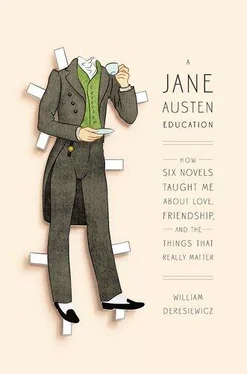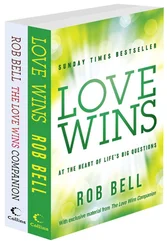Chapter 7
the end of the story
It was early in September of my fourth year in Brooklyn. I was halfway through the third and final chapter of my dissertation and had just gone back to teaching. Meanwhile, my friend from Connecticut, the one who had fallen in love the previous year, was already getting ready for his wedding. The big event was planned for November, but he and his fiancée threw a party at their new house the weekend after Labor Day, so all their friends could get to know each other in advance.
His fiancée had grown up in Cleveland, and her best friend from home—like Austen and Martha Lloyd, the woman who shared her house, they were practically sisters—was going to be driving out for the festivities. I had heard that she was coming, and that she was single, but we didn’t hit it off at first. They were playing Sinatra when I showed up, and even though I liked Sinatra, I tried to make an entrance with a snarky comment (“Can we please put on something a little less farty?”) that—shades of Darcy and Elizabeth—only succeeded in making her think me a jerk.
We took our separate paths into the depths of the party, and I had all but forgotten about her a couple of hours later when I found us entangled, out of nowhere—another Pride and Prejudice moment—in the midst of an intricate, impassioned conversation. The subject was political; like an Austen heroine, I later discovered, she was testing to see if I had the right values. Slowly, as we stood there hashing it out, it began to dawn on me that the woman I had scarcely glanced at when I came in—I didn’t know how I had managed to miss this—was, as Mr. Darcy put it, one of the handsomest women of my acquaintance. Not just beautiful, in other words, but attractive in a deeply compelling way.
Before the night was out, we were both completely hooked. I stayed for the rest of the weekend, then found myself devastated when we had to say good-bye. But neither one of us was going to let it go. We were five hundred miles apart, but before we knew it we were on the phone for hours at a time, doing exactly what Austen would have wanted us to do: learning about each other, and respecting each other, by listening to each other’s stories.
We talked about our families, painted pictures of our lives, explored our thoughts about everything under the sun. I was paying attention not only to what she had to say, but also to the way that she expressed herself in saying it. The technology may have been updated for the twentieth century, but otherwise it was exactly the same thing that had happened between Elinor and Edward, and all of Austen’s other heroes and heroines, too. I was discovering the temper of this woman’s heart and mind—her “sentiments” and “opinions,” her “imagination” and “observation” and “taste”—and she was doing the same with me. We were developing that mutual regard and esteem that comes from knowledge of a person’s character, not body. The latter we already had—we hadn’t just talked, that weekend—but this was every bit as intimate. In fact, unlike Austen’s young people, we couldn’t even see each other. It was a completely disembodied experience: just two voices meeting in the night, a conversation of souls, a separate little privacy that only we inhabited.
“I’m crazy about her!” I told my friend’s fiancée.
“Keep it together,” she said. “I know she likes you, but if you come on too strong, you’ll scare her off.”
I kept it together, but it was tough. The woman I had met that weekend, I discovered as we whispered in each other’s ears on all those nights, was brilliant, articulate, intuitive, and stunningly insightful. She knew how to talk, and she also knew how to listen. She was cerebral without self-importance, sophisticated without pretension. She had a wicked sense of humor, too, one that Austen would have certainly enjoyed. I told her about someone I once knew who prided himself on his supposedly large vocabulary but who hadn’t known the difference between “impotent” and “indolent,” because he didn’t know what either one of them meant. “I know the difference,” she shot back. “Can’t and won’t.”
She was also very different than me, more so than anyone I had ever been involved with. She had grown up middleclass, but she didn’t have an expensive education and wasn’t on her way to being a professional. She waited tables, like the woman I’d been seeing when I first read Austen and for whom I had had so little respect. She had been a shoeshine girl, had clerked at a record store, and was still slowly finishing her degree at a local public college as she worked full time. What’s more, she had spent time with the kinds of people who I, with my sheltered elitist existence, had scarcely ever even talked to: working-class kids, art-school types, punk rockers, street people, old hippies.
The little Ivy League voice inside my head, which I had gotten from my family, was frantic about how unprestigious this all sounded. The little New York voice, which I had gotten from those fancy friends as well as from my general environment, had contempt for how unimpressive it looked. But I had read Emma, and knew that books were not the only way to learn, and I had read Mansfield Park, and knew that status and “success,” so called, did not make a person valuable, and I didn’t listen to those voices anymore. I had learned the lessons of Austen’s love stories, and I understood that you should be with someone who isn’t just your mirror image, someone you didn’t see coming, someone who takes you beyond yourself. On just the other side of all those petty fears, I sensed the promise of immense possibilities.
About a month after that initial weekend, she drove out to Brooklyn to see if we really wanted to keep the relationship going, given how completely inconvenient it was. And what we discovered, as we each tried to figure out whether the other person was someone we could fall in love with, was that we already had. It had been coming on so gradually, as Elizabeth Bennet would have put it, that we hardly knew when it began.
The city never seemed so sweet to me as it did that fall. As I walked along the familiar streets, now utterly transformed, I bore my love for her about with me like an invisible crown. I’d thought I knew what love was meant to feel like, but I realized I hadn’t had a clue. It had always been a thing that I could feel inside me, yet now it seemed like it was everywhere, filling everything, an atmosphere I moved within. I’d also always thought that relationships were something that you chose to have. But I hadn’t chosen this one; it had chosen me. The question of whether I had a loving heart had answered itself.
It wasn’t all smooth sailing, though. There were fights—of course there were. Neither one of us was perfect, certainly not me. When something came up, I still dug my trenches like anyone else. But what saved me, at those times, were two things that I had learned from Austen: that my girlfriend’s perspective was just as valid as mine, however much it killed me in the middle of an argument to acknowledge it, and that if I had done something wrong, then allowing myself to recognize as much—no matter how awful it was to admit it, no matter how humiliating it was to have to lose a fight in which I had invested so much ego—was ultimately going to be good for me.
There would come a moment, after the minutes or the hours of conflict, in the middle of the hard words, when I would catch a glimpse, just a tiny glimpse, not just of the fact that I owed my girlfriend the apology that I knew I’d have to rake up my guts to give her, but that if I managed to cross that burning bridge, there would be something in it for me. I would learn; I would grow. I wouldn’t have to make the same mistake again. I could be a better partner to her in the future, and a better person myself. That glimpse, that was the rope that was lowered into my cave; that was what enabled me to climb back out to sanity and love. And on her side, it was just the same. She helped me learn to say I’m sorry, and she helped me teach her, too.
Читать дальше












